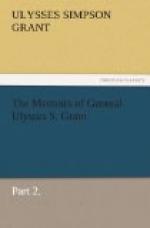The present constitution of the State of Michigan was ratified during this time. By the terms of one of its provisions, all citizens of the United States residing within the State at the time of the ratification became citizens of Michigan also. During my stay in Detroit there was an election for city officers. Mr. Zachariah Chandler was the candidate of the Whigs for the office of Mayor, and was elected, although the city was then reckoned democratic. All the officers stationed there at the time who offered their votes were permitted to cast them. I did not offer mine, however, as I did not wish to consider myself a citizen of Michigan. This was Mr. Chandler’s first entry into politics, a career he followed ever after with great success, and in which he died enjoying the friendship, esteem and love of his countrymen.
In the spring of 1851 the garrison at Detroit was transferred to Sackett’s Harbor, and in the following spring the entire 4th infantry was ordered to the Pacific Coast. It was decided that Mrs. Grant should visit my parents at first for a few months, and then remain with her own family at their St. Louis home until an opportunity offered of sending for her. In the month of April the regiment was assembled at Governor’s Island, New York Harbor, and on the 5th of July eight companies sailed for Aspinwall. We numbered a little over seven hundred persons, including the families of officers and soldiers. Passage was secured for us on the old steamer Ohio, commanded at the time by Captain Schenck, of the navy. It had not been determined, until a day or two before starting, that the 4th infantry should go by the Ohio; consequently, a complement of passengers had already been secured. The addition of over seven hundred to this list crowded the steamer most uncomfortably, especially for the tropics in July.
In eight days Aspinwall was reached. At that time the streets of the town were eight or ten inches under water, and foot passengers passed from place to place on raised foot-walks. July is at the height of the wet season, on the Isthmus. At intervals the rain would pour down in streams, followed in not many minutes by a blazing, tropical summer’s sun. These alternate changes, from rain to sunshine, were continuous in the afternoons. I wondered how any person could live many months in Aspinwall, and wondered still more why any one tried.
In the summer of 1852 the Panama railroad was completed only to the point where it now crosses the Chagres River. From there passengers were carried by boats to Gorgona, at which place they took mules for Panama, some twenty-five miles further. Those who travelled over the Isthmus in those days will remember that boats on the Chagres River were propelled by natives not inconveniently burdened with clothing. These boats carried thirty to forty passengers each. The crews consisted of six men to a boat, armed with long poles. There were planks wide enough for a man to walk on conveniently, running along the sides of each boat from end to end. The men would start from the bow, place one end of their poles against the river bottom, brace their shoulders against the other end, and then walk to the stern as rapidly as they could. In this way from a mile to a mile and a half an hour could be made, against the current of the river.




